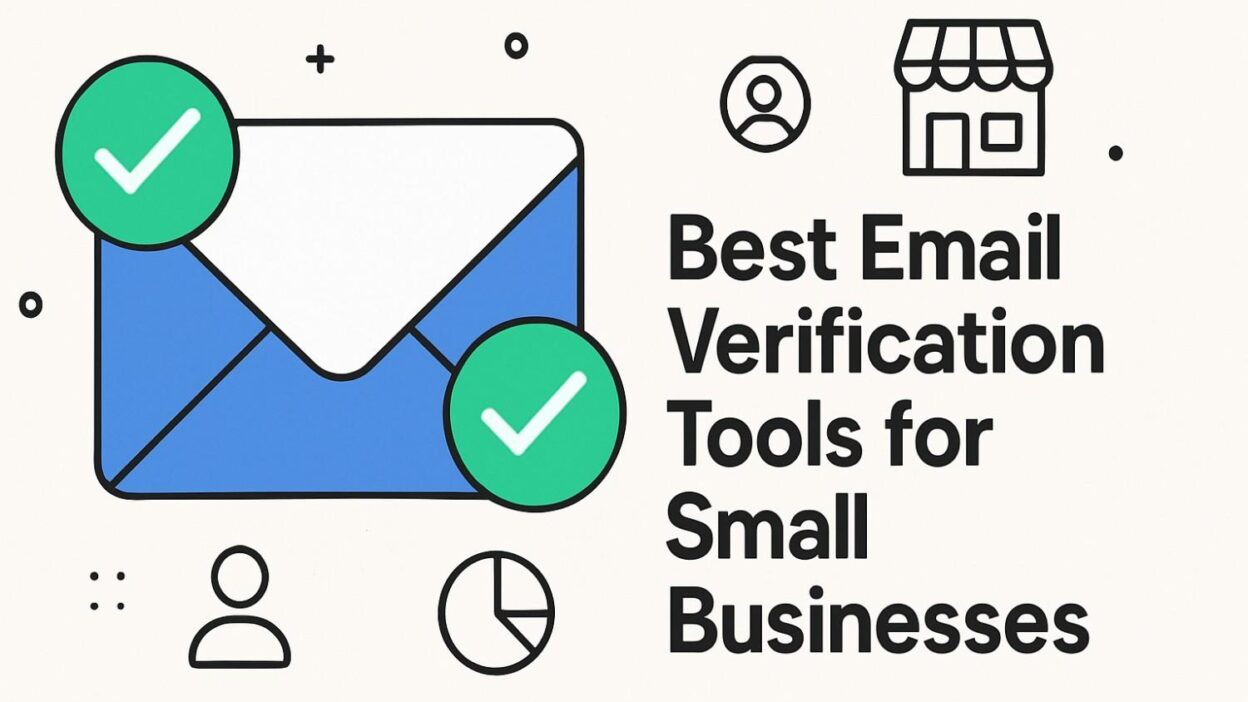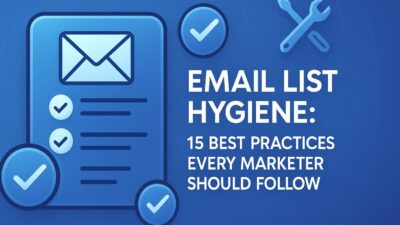Small businesses lose thousands of dollars annually to poor email deliverability, with invalid email addresses being the primary culprit behind bounce rates that can destroy sender reputation and reduce marketing effectiveness. Research shows that 22.5% of email databases decay naturally each year, meaning that without proper verification, nearly a quarter of your carefully built email list becomes worthless.
For small businesses operating on tight budgets, the challenge isn’t just finding an email verification tool – it’s finding one that delivers enterprise-level accuracy without enterprise-level pricing. The wrong choice can mean paying for verification that doesn’t work, while the right tool can improve deliverability rates by 25-40% and provide immediate return on investment through better campaign performance.
Email verification has evolved far beyond simple syntax checking to include sophisticated algorithms that detect spam traps, identify risky domains, analyze engagement patterns, and predict deliverability outcomes. The tools available today can distinguish between genuinely invalid addresses and temporary issues, helping businesses maintain clean lists without losing legitimate subscribers.
The most successful small businesses understand that email verification isn’t an optional expense – it’s a critical infrastructure investment that protects their sender reputation, improves customer relationships, and maximizes the return on every email marketing dollar spent.
This comprehensive guide examines both free and paid email verification tools specifically chosen for small business needs, analyzing accuracy rates, pricing structures, integration capabilities, and practical implementation considerations to help you make the best choice for your specific situation.
Table of Contents
Understanding Email Verification for Small Businesses
Email verification serves as the foundation of successful email marketing, but small businesses often underestimate its importance until deliverability problems damage their campaigns. Invalid email addresses create bounce rates that signal poor list quality to email service providers, resulting in automatic filtering and reduced inbox placement that can cut campaign effectiveness by half.
The verification process involves multiple validation steps that go far beyond checking if an email address looks correct. Syntax validation ensures proper formatting, domain verification confirms the receiving server exists, mailbox validation checks if the specific address can receive emails, and risk assessment identifies potential spam traps or problematic addresses.
Small business challenges include limited budgets for verification services, lack of technical expertise to implement complex solutions, and difficulty determining which verification features are essential versus nice-to-have. Cost-per-verification can range from $0.0003 to $0.10 depending on the service and volume, making tool selection crucial for budget management.
Verification timing affects both costs and effectiveness. Real-time verification at point of subscription prevents bad addresses from entering your list but costs more per verification. Batch verification of existing lists costs less but may include addresses that were valid when collected but have since become invalid.
Integration requirements vary significantly between tools, with some offering simple CSV upload/download while others provide sophisticated APIs that integrate directly with email marketing platforms, CRM systems, and websites. Small businesses often need solutions that work with popular platforms like Mailchimp, Constant Contact, or HubSpot without requiring custom development.
Accuracy expectations should be realistic, as no verification service achieves 100% accuracy. Industry-leading tools typically achieve 96-99% accuracy for clearly valid or invalid addresses, but catch-all domains and role-based addresses present ongoing challenges that affect verification confidence levels.
Top Free Email Verification Tools
Free email verification tools provide small businesses with cost-effective options to improve list quality, though they often come with usage limitations or reduced feature sets compared to paid alternatives. Understanding the constraints and capabilities of free tools helps businesses determine whether they meet current needs or if paid solutions are necessary.
Saleshandy Free Email Verifier
Saleshandy’s free email verification tool stands out for small businesses because it provides 50 free verification credits monthly without requiring credit card information or time-limited trials. The tool performs 24 comprehensive validation checks on each email address and provides clear results categorized as Deliverable, Undeliverable, Accept-All, Role-Based, Disposable, or Unknown.
Verification accuracy reaches 98% according to the company’s testing, and the tool can process both individual addresses and bulk uploads. The integration advantage comes from Saleshandy’s broader platform that includes lead finding, email sequencing, and inbox placement testing, making it valuable for businesses that need comprehensive email marketing capabilities.
Key features include real-time API verification, bulk processing capabilities, GDPR compliance, and integration with popular CRM systems. The limitation is the 50-credit monthly cap, which may be insufficient for businesses with large lists or frequent verification needs.
Verifalia Free Validator
Verifalia offers a straightforward free email validation service that checks individual email addresses without registration requirements. The tool provides real-time verification results showing whether an address is properly formatted, exists, and can receive emails, with the verification process being completely discreet.
Technical capabilities include syntax validation, domain existence verification, and mailbox accessibility testing. The advantage for small businesses is the ability to quickly verify suspicious addresses without commitment, making it ideal for spot-checking addresses before adding them to email campaigns.
Limitations include the single-address-at-a-time restriction and lack of bulk processing capabilities. Best use cases involve verifying individual addresses during customer service interactions or validating important prospects before adding them to email sequences.
Hunter.io Free Plan
Hunter.io provides email verification as part of its broader lead generation platform, offering 25 free verification credits monthly for new users. The tool combines email finding with verification capabilities, making it particularly valuable for businesses that need both prospect research and list cleaning.
Verification features include bulk processing, API access, and integration with popular email marketing platforms. The accuracy rate is competitive with paid tools, and the platform provides detailed reporting on verification results including confidence scores for borderline addresses.
Business value extends beyond verification to include email finding, domain search capabilities, and prospect research tools. Limitations include the relatively low free credit allocation and the need for higher-tier plans to access advanced features.
Email Vendor Free Options
Several established email verification companies offer limited free tiers that small businesses can leverage. ZeroBounce provides 100 free verification credits monthly for businesses with verified domains, while NeverBounce offers 1,000 free credits as a trial.
Bouncer offers the first 1,000 credits free, making it one of the most generous free trials available. MillionVerifier provides never-expiring credits that can be purchased once and used over time, though their free offering is limited.
Strategic considerations for using free tiers include understanding credit renewal policies, feature limitations compared to paid plans, and upgrade paths when verification needs grow beyond free allocations.
Premium Email Verification Tools Comparison
Paid email verification tools offer enhanced accuracy, higher processing volumes, advanced features, and better support that justify their cost for businesses with substantial email marketing operations. Return on investment typically comes through improved deliverability rates, reduced bounce penalties, and better campaign performance.
ZeroBounce
ZeroBounce positions itself as a security-focused verification service with military-grade encryption and compliance with SOC 2 Type II, ISO 27001, and HIPAA standards. The platform achieves 99% verification accuracy and maintains a low 1.69% unknown result rate, meaning businesses waste fewer credits on unverifiable addresses.
Advanced features include spam trap detection, abuse email identification, disposable email detection, and catch-all domain scoring. The AI Scoring system helps businesses assess email quality beyond simple valid/invalid classifications, providing insights into engagement probability and delivery success likelihood.
Processing speed handles 10,000 emails in approximately 43 minutes, making it suitable for businesses with large lists. Integration capabilities include connections to 45+ platforms including Mailchimp, HubSpot, Salesforce, and custom API implementations.
Pricing starts at higher levels compared to some competitors, but includes additional services like Inbox Placement Testing and DMARC monitoring that provide comprehensive email deliverability management. Best suited for businesses that prioritize security compliance and need comprehensive deliverability tools.
NeverBounce
NeverBounce claims the highest accuracy rate at 99.9% and offers real-time verification APIs that integrate seamlessly with existing business processes. The platform provides 1,000 free credits to start and offers both pay-as-you-go and monthly subscription pricing.
Key differentiators include 80+ integrations including Zapier for workflow automation, multi-user account management, and robust API documentation for custom implementations. The verification process uses multiple validation techniques and provides detailed result categories.
Pricing structure at $8 per 1,000 emails falls in the mid-range category, with volume discounts available for larger operations. Processing speed and customer support are frequently praised in user reviews, making it popular among businesses that need reliable, fast verification.
Enterprise features include team collaboration tools, detailed reporting and analytics, and compliance management features that scale with business growth.
Bouncer
Bouncer emphasizes budget-friendly verification with pay-as-you-go options starting at $8 for 1,000 email addresses and monthly subscriptions offering the same volume for $6.40. The platform achieves 99.5% accuracy and includes toxic email analysis for risk assessment.
Unique offerings include a deliverability kit with inbox placement testing, authentication verification, and blocklist monitoring for businesses that need comprehensive email health management. Real-time verification is available starting at $49 monthly for 10,000 checks.
Performance characteristics include fast processing times of approximately 5 minutes for standard lists and bounce rates below 1% in testing. The interface has been noted as slower than some competitors, but the accuracy and pricing make it attractive for cost-conscious businesses.
Best applications include businesses with variable verification needs that benefit from pay-as-you-go pricing and those requiring comprehensive deliverability monitoring beyond basic verification.
Kickbox
Kickbox offers both bulk verification and real-time API services with a proprietary Sendex™ Score that measures email address quality beyond binary valid/invalid classifications. The platform provides up to 100 free verifications and uses simple pay-as-you-go pricing.
Security and compliance features include robust data protection and regulatory compliance with various standards, making it suitable for businesses with strict data handling requirements. Verification speed and accuracy receive positive reviews, though some users report slower customer support response times.
Analytics and reporting provide detailed insights into list quality, verification results, and recommendations for improving email deliverability. API integration capabilities allow seamless connection with existing business systems and workflows.
Pricing transparency includes clear cost calculations based on verification volume, though some advanced features may require higher-tier plans.
MillionVerifier
MillionVerifier (formerly HuBoCo) offers never-expiring credits that provide flexibility for businesses with irregular verification needs. The platform supports both file uploads and direct copy-paste of email addresses, plus real-time API verification.
Integration capabilities include connections with popular email marketing platforms for automated list cleaning, making it attractive for businesses using platforms like Mailchimp, AWeber, or HubSpot. Budget-friendly pricing with instant cost calculation based on verification volume.
Accuracy challenges have been noted with catch-all domains and Yahoo email addresses, though overall performance remains competitive. Customer support availability is limited to business hours, which may be a consideration for businesses needing immediate assistance.
Best suited for businesses that verify emails intermittently and prefer to purchase credits in advance rather than maintaining monthly subscriptions.
Feature Comparison Matrix
Understanding the specific features offered by different email verification tools helps small businesses choose solutions that match their operational needs and technical capabilities. Feature prioritization should align with business size, technical expertise, and integration requirements.
Accuracy and Verification Methods
Verification accuracy ranges from 96% to 99.9% across premium tools, but accuracy measurement methodologies vary between providers. Comprehensive verification includes syntax checking, domain validation, MX record verification, mailbox existence testing, spam trap detection, and disposable email identification.
ZeroBounce and NeverBounce consistently achieve the highest accuracy ratings, with ZeroBounce maintaining particularly low unknown result rates. Saleshandy offers competitive accuracy at 98% with comprehensive validation checks.
Risk assessment capabilities vary significantly, with some tools providing simple valid/invalid results while others offer sophisticated scoring systems that predict engagement likelihood and delivery success. Advanced risk detection includes spam trap identification, role-based address detection, and domain reputation analysis.
Catch-all domain handling presents challenges for all verification services, as these domains accept all incoming emails but may not deliver them to actual recipients. Tools differ in how they score and report catch-all addresses, affecting business decisions about whether to email these addresses.
Processing Speed and Volume Limits
Bulk verification speed varies considerably between tools, with ZeroBounce processing 10,000 emails in 43 minutes while Bouncer completes similar volumes in 5 minutes. Processing speed becomes critical for businesses with large lists or time-sensitive campaigns.
Volume limits on free tiers range from 25 credits monthly (Hunter.io) to 1,000 credits (Bouncer trial) to unlimited verification for individual addresses (Verifalia). Credit renewal policies affect ongoing usability of free services.
API rate limits for real-time verification vary between providers, with some offering unlimited API calls within subscription limits while others implement per-minute or per-hour restrictions. Real-time verification requirements should align with business needs for signup form validation or CRM integration.
Concurrent processing capabilities allow faster verification of large lists by processing multiple addresses simultaneously, though this feature is typically limited to premium plans.
Integration and API Capabilities
Native integrations range from 12 (BriteVerify) to 80+ (NeverBounce), with popular email marketing platforms like Mailchimp, HubSpot, and Salesforce supported by most premium tools. Integration depth varies from simple data export/import to sophisticated two-way synchronization.
API documentation quality affects implementation difficulty for businesses with custom integration needs. Well-documented APIs with SDKs in multiple programming languages simplify integration for businesses with development resources.
Webhook support allows real-time notifications of verification results, enabling automated workflow triggers based on verification outcomes. Zapier integration provides no-code automation options for businesses without development expertise.
Bulk upload options include CSV file support, direct data paste, and API batch processing, with some tools offering automatic CSV formatting to simplify the upload process.
Security and Compliance Features
Data security standards vary significantly between providers, with ZeroBounce offering military-grade encryption and comprehensive compliance certifications. GDPR compliance is standard among reputable providers, but specific certifications like SOC 2 Type II, ISO 27001, and HIPAA are available only from premium services.
Data retention policies affect how long verification results and uploaded email addresses are stored, with some providers offering immediate deletion options while others retain data for service improvement purposes. Privacy-conscious businesses should evaluate retention policies carefully.
Geographic data processing considerations include where verification servers are located and whether data crosses international boundaries during processing. EU-based processing may be required for businesses with strict data locality requirements.
Audit trails and logging provide verification history for compliance purposes, though this feature is typically available only in enterprise-tier plans.
Pricing Analysis for Small Businesses
Cost-effectiveness in email verification depends on verification volume, required features, and business growth projections. Price-per-verification varies dramatically based on volume commitments and service tiers, making careful analysis essential for budget planning.
Pay-As-You-Go vs. Subscription Models
Pay-as-you-go pricing works best for businesses with irregular verification needs or those starting email marketing programs. Bouncer offers competitive pay-as-you-go at $8 per 1,000 emails, while MillionVerifier provides never-expiring credits that offer maximum flexibility.
Monthly subscription models typically provide better per-verification pricing for businesses with consistent verification volumes. Subscription benefits include predictable costs, often better feature access, and priority support, but require ongoing commitment regardless of actual usage.
Volume-based pricing tiers can significantly reduce costs for high-volume users, with some providers offering discounts up to 70% for large verification volumes. Small businesses should project growth carefully to avoid over-committing to volume tiers that won’t be used.
Credit rollover policies vary between providers, with some allowing unused credits to carry forward indefinitely while others implement monthly expiration. Rollover policies significantly affect value for businesses with variable verification needs.
Free Tier Limitations and Upgrade Paths
Free tier constraints typically include monthly credit limits, feature restrictions, and limited support. Saleshandy’s 50 monthly credits provide ongoing value, while trial-based free offerings require eventual upgrade decisions.
Feature limitations on free tiers often exclude advanced risk assessment, priority processing, API access, or integration capabilities. Businesses should evaluate whether free tier limitations create operational constraints that justify paid upgrades.
Upgrade incentives may include discounted first-month pricing, bonus credits, or extended trial periods for converting from free to paid plans. Timing upgrades strategically can maximize value from promotional offers.
Downgrade policies vary significantly, with some providers allowing flexible plan changes while others lock users into annual commitments. Small businesses should understand cancellation and downgrade terms before committing to paid plans.
Return on Investment Calculations
ROI measurement for email verification includes improved deliverability rates, reduced bounce penalties, increased campaign effectiveness, and protected sender reputation. Typical improvements range from 15-25% better deliverability after implementing proper verification practices.
Cost savings come from reduced email sending costs (by eliminating invalid addresses), improved campaign performance (higher engagement rates), and avoided reputation damage (preventing blacklisting and sending restrictions).
Revenue impact includes increased sales from better email deliverability, improved customer relationships from reliable communications, and reduced customer service costs from fewer delivery problems.
Payback periods for email verification investments typically range from 30-90 days for businesses with active email marketing programs, making verification one of the fastest-returning marketing technology investments.
Implementation Best Practices
Successful email verification implementation requires strategic planning, proper tool configuration, and ongoing maintenance procedures. Implementation mistakes can waste verification credits, miss problematic addresses, or create operational inefficiencies that reduce tool effectiveness.
Setting Up Verification Workflows
Verification timing strategy should balance cost efficiency with list quality needs. Real-time verification at point of subscription prevents bad addresses from entering lists but costs more per address. Batch verification of existing lists costs less but may include addresses that were valid when collected.
Segmentation strategies can optimize verification costs by prioritizing high-value segments for premium verification while using basic validation for lower-priority addresses. Engagement-based segmentation allows focusing verification resources on subscribers most likely to respond to campaigns.
Integration planning should consider data flow requirements, API rate limits, error handling procedures, and result processing workflows. Automated workflows reduce manual effort but require proper configuration to handle edge cases and verification failures.
Quality control processes should include sample verification testing, result validation procedures, and accuracy monitoring to ensure verification tools perform as expected and deliver promised accuracy rates.
Data Management and List Hygiene
Pre-verification preparation includes data formatting, duplicate removal, and segmentation to maximize verification efficiency and accuracy. Clean data inputs produce better verification results and reduce costs from unnecessary processing.
Result categorization requires understanding verification result types and developing appropriate actions for each category. Invalid addresses should be immediately suppressed, while risky addresses may require additional evaluation before removal decisions.
Suppression list management involves maintaining updated lists of addresses that should never receive emails, including hard bounces, spam complaints, and manual unsubscribes. Proper suppression management prevents verification tools from processing addresses that shouldn’t be mailed regardless of validity.
Regular maintenance schedules should include periodic re-verification of aging addresses, ongoing engagement monitoring, and systematic removal of consistently non-engaging subscribers to maintain list health over time.
Monitoring and Optimization
Performance tracking should monitor verification accuracy, processing speed, cost efficiency, and deliverability improvements to ensure tools deliver expected value. Regular performance reviews help identify optimization opportunities and tool switching needs.
A/B testing different verification approaches helps optimize accuracy vs. cost trade-offs and identify the most effective verification strategies for specific business needs. Testing should include verification timing, result handling, and tool comparison studies.
Deliverability monitoring provides feedback on verification effectiveness by tracking bounce rates, spam folder placement, and engagement metrics after implementing verification processes. Improved metrics validate verification investment while deteriorating performance indicates process problems.
Cost optimization involves monitoring per-verification costs, credit utilization rates, and ROI metrics to ensure verification spending aligns with business value received. Regular cost reviews help identify opportunities for plan optimization or tool switching.
Common Mistakes to Avoid
Email verification implementation mistakes can waste money, damage deliverability, and create operational problems that reduce marketing effectiveness. Understanding common pitfalls helps small businesses avoid expensive errors and achieve better results from verification investments.
Over-Verification and Budget Waste
Excessive verification occurs when businesses verify addresses more frequently than necessary or verify addresses that don’t require validation. Engaged subscribers who regularly open and click emails rarely need re-verification, making frequent validation of active segments wasteful.
Wrong tool selection based solely on price comparisons without considering accuracy requirements, integration needs, and feature importance can result in poor verification results that require additional processing with different tools.
Credit waste happens when businesses fail to configure verification tools properly, resulting in processing addresses that should be excluded or failing to leverage bulk discounts available for larger verification volumes.
Unnecessary real-time verification for low-risk address sources increases costs without proportional benefits. Strategic verification timing balances cost control with list quality needs.
Inadequate Result Processing
Ignoring verification results by failing to remove invalid addresses or continuing to mail risky addresses negates verification benefits and can worsen deliverability problems. Verification without action wastes investment and may create false confidence in list quality.
Poor categorization handling occurs when businesses treat all verification results the same rather than developing appropriate strategies for different result types. Role-based addresses, catch-all domains, and risky addresses each require different handling approaches.
Inadequate suppression management allows previously identified bad addresses to be re-verified repeatedly, wasting credits and resources. Proper suppression list maintenance prevents processing addresses that should never receive emails.
Delayed result implementation reduces verification effectiveness by allowing bad addresses to remain active while verification results sit unprocessed. Automated result processing ensures verification benefits are realized quickly.
Integration and Technical Issues
Poor API implementation can result in verification failures, data synchronization problems, and workflow interruptions that reduce email marketing effectiveness. Proper API integration requires error handling, rate limit management, and result processing automation.
Inadequate testing of verification workflows before full implementation can miss integration problems, result processing errors, and edge case handling failures. Thorough testing with small data samples identifies problems before they affect large-scale operations.
Insufficient monitoring of verification processes allows performance degradation, accuracy problems, and cost overruns to persist undetected. Regular monitoring ensures verification continues delivering expected value over time.
Security oversights in API key management, data transmission, and result storage can create vulnerabilities that compromise customer data or business operations. Proper security implementation protects sensitive email address data throughout the verification process.
Choosing the Right Tool for Your Business
Selecting the optimal email verification tool requires matching business needs, budget constraints, technical capabilities, and growth projections with available tool features and pricing structures. The wrong choice can waste money and fail to solve deliverability problems, while the right tool provides immediate ROI and supports business growth.
Business Size Considerations
Micro businesses (under 500 contacts) often find free tools sufficient for their verification needs, with Saleshandy’s 50 monthly credits or Verifalia’s individual address verification providing adequate coverage. Focus should be on ease of use and basic accuracy rather than advanced features.
Small businesses (500-5,000 contacts) typically need paid verification tools with bulk processing capabilities and basic integrations. Bouncer’s pay-as-you-go pricing or MillionVerifier’s never-expiring credits offer good value for irregular verification needs.
Growing businesses (5,000-25,000 contacts) require comprehensive verification tools with advanced features, strong integrations, and scalable pricing. ZeroBounce or NeverBounce provide enterprise-grade capabilities at reasonable prices for this segment.
Established small businesses (25,000+ contacts) need enterprise-level tools with high-volume pricing, advanced risk assessment, and comprehensive deliverability management. Investment in premium tools typically provides strong ROI through improved campaign performance.
Technical Expertise Requirements
Non-technical users should prioritize simple interfaces, clear result categorization, and minimal setup requirements. Tools with drag-and-drop upload, automated result processing, and clear documentation reduce implementation complexity.
Moderately technical users can leverage API integrations, webhook configurations, and custom workflow automation to improve verification efficiency and effectiveness. Mid-tier tools often provide good balance of features and usability.
Technical teams can maximize value from advanced API features, custom integrations, and sophisticated result processing workflows. Enterprise tools often justify their cost through technical capabilities that less technical users can’t fully utilize.
Outsourced management options are available through email marketing agencies and consultants who can implement and manage verification tools for businesses lacking internal expertise.
Budget and ROI Planning
Budget allocation should consider verification costs, implementation time, ongoing management effort, and expected deliverability improvements. Total cost of ownership includes tool costs plus internal resources required for implementation and management.
ROI expectations should be realistic based on current deliverability problems and business email dependence. Businesses with high bounce rates see faster ROI than those with already-clean lists.
Growth planning involves selecting tools that can scale with business needs without requiring complete replacement. Flexible pricing models and upgrade paths prevent outgrowing verification tools quickly.
Cost monitoring should track per-verification costs, monthly spending, and deliverability improvements to ensure verification continues providing positive ROI as business needs evolve.
Email verification represents one of the most critical investments small businesses can make in their email marketing infrastructure. With 22.5% of email addresses naturally decaying annually and verification tools capable of improving deliverability by 25-40%, the ROI case for proper verification is compelling and immediate.
The tool landscape offers options for every business size and budget, from generous free tiers like Saleshandy’s 50 monthly credits to enterprise-grade solutions like ZeroBounce with military-grade security. Success depends on matching tool capabilities to business needs rather than choosing based solely on price or feature lists.
Implementation strategy matters as much as tool selection. Businesses that approach verification systematically – with proper workflow design, result processing procedures, and ongoing monitoring – achieve consistently better results than those using verification tools as occasional remedies for deliverability problems.
Free tools provide excellent starting points for small businesses beginning their email verification journey, while paid tools become necessary as lists grow and deliverability requirements increase. The upgrade path should be planned based on business growth projections and email marketing maturity.
The cost of not verifying emails – through damaged sender reputation, reduced deliverability, and lost revenue opportunities – far exceeds the investment in proper verification tools. Businesses that prioritize list quality through systematic verification consistently outperform competitors struggling with deliverability problems.
Choose verification tools based on accuracy requirements, integration needs, budget constraints, and technical capabilities. Start with free options to understand verification benefits, then upgrade to paid tools as business needs justify the investment. The right verification tool becomes a critical business asset that protects and enhances email marketing effectiveness for years to come.
Contact
Email: [email protected]
Website:-www.fareof.com





